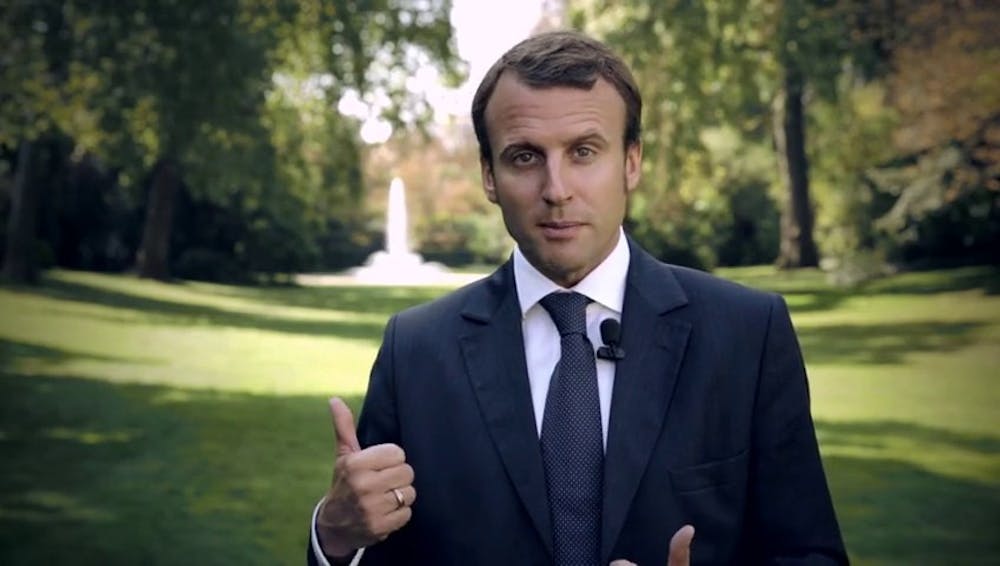Centrist Emmanuel Macron won a sizable victory over far-right nationalist Marine Le Pen, according to current presidential vote counts from the French Interior Ministry. French citizens at the University reacted with relief to his victory.
“Expectation does not trivialize the collective sigh of relief now that Macron has won,” Naomi ’17, who was enrolled in the French school system until grade 8 and interned for its government, wrote in an email. Naomi has requested the Prince hide her last name for anonymity.
With 99 percent of communes reporting, Macron won an estimated 66 percent of the vote over Le Pen’s 34 percent. The abstention rate, about 25 percent, was the highest in French presidential elections since 1969.
A former investment banker and economy minister, Macron will become the youngest president in French history and the youngest head of state since Napoleon Bonaparte, at age 39.
“The election of Emmanuel Macron as President of France should be seen as a message of hope in a world where populism and extremes are strengthening,” Paul Gauthier, Associate Research Scholar and Lecturer in the department of Geosciences, wrote in an email. Gauthier is one of the founders of Princeton’s French, a citizen group that encouraged French citizens to vote in this election.
Macron’s election was predicted for months, according to Gauthier.
“However, considering more recent elections, we knew that nothing is won until the last minute," Gauthier said, referring to the Brexit vote and the election of President Donald Trump.
Macron’s opponent, Le Pen, is the leader of the National Front, which was founded by her father Jean-Marie, and threatened to follow in the United Kingdom’s footsteps and leave the European Union. Macron’s victory protects against this threat, as his platform includes loosening labor laws and making the country more competitive in the global market.

The country witnessed a number of terrorist attacks in the past two years and currently has a 23-percent youth unemployment rate.
Macron, head of a new centrist political movement, En Marche! (Onward!), will need to gather support in Parliament, where his party holds no seats.
“Macron will inherit a politically divided country full of fears and expectations,” Gauthier wrote. “He has the ideas and the strength to carry [progressive] reforms but he still needs to get a strong majority to help him with his project for France.”
Sebastien Philippe GS, a French citizen, noted that Macron’s decision to run outside the major political parties — Les Républicains and Parti Socialiste — was very wise, as Macron understood these parties would not attract voters. Les Républicans were formerly known as the Union pour un Mouvement Populaire.

“People are bored of the complexity of the political system,” Gauthier wrote, adding that when citizens feel that they are not being taken into account, “they become anti-establishment and beg for a change.”
Gauthier pointed to Nicolas Sarkozy’s election in 2008, which led to no significant change, and Francois Hollande’s 2012 election, which promised change to no avail.
“When the main two parties were left behind, the only parties left were the extremes,” Gauthier continued. “Many decided to go this way even if they did not agree with most of their politics.”
Although Macron was a political outsider until his election, he worked in high-powered finance, making him “very much a member of the ‘establishment,’” according to Naomi.
“[Macron] is the product of the establishment and possibly [its] perfect incarnation,” Philippe wrote in an email. “This is perhaps why he was able to gather so many supporters within the French elite so quickly,” Philippe added.
Mikhael Smits ’18, also a French citizen, wrote in an email that “this election brought out the ugliest parts of democracy, with fascist and communist campaigns fighting to drag France back into the last century.”
Macron’s discussion of the EU and France’s future seemed promising, according to Smits.
“But despite his political-homelessness and inexperience, it otherwise promises to be more of the same,” he added.
Smits characterized the election as a choice “between a centrist and a Russian-funded, intolerant, protectionist nuclear option.”
“Le Pen is not an outsider,” Philippe wrote, “she has been around for a long time. Same thing for her party. It is probably why she now wants to reshape the extreme right.”
“She rightly claims to have brought [her father’s party] more into the mainstream,” Naomi wrote.
The difference between the French and US elections is that, unlike Trump, Le Pen represented the old order, and people understood “how incompetent and dangerous she was,” according to Philippe.
Along with Smits, Philippe looks forward to seeing the how the parliamentary election turns out this June, noting that it “will be key and we will know then to which extent political forces that emerged during the election including on the left will have an impact on his 5-year term.”
The election “is an enormous shake-up of the French political landscape,” wrote Philippe. “It is also a great relief that the wave of national-populism broke on the French shore and did not sweep the country.”
“French people [can] finally think that decisions will be made in . . . respect of the French values of ‘Liberté, Egalité et Fraternité’ in a stronger and more meaningful Europe,” added Gauthier.
In his victory speech, Macron said he “will defend France, its vital interests, its image.”
In the United States, President Donald Trump tweeted, “Congratulations to Emmanuel Macron on his big win today as the next President of France. I look very much forward to working with him!”








